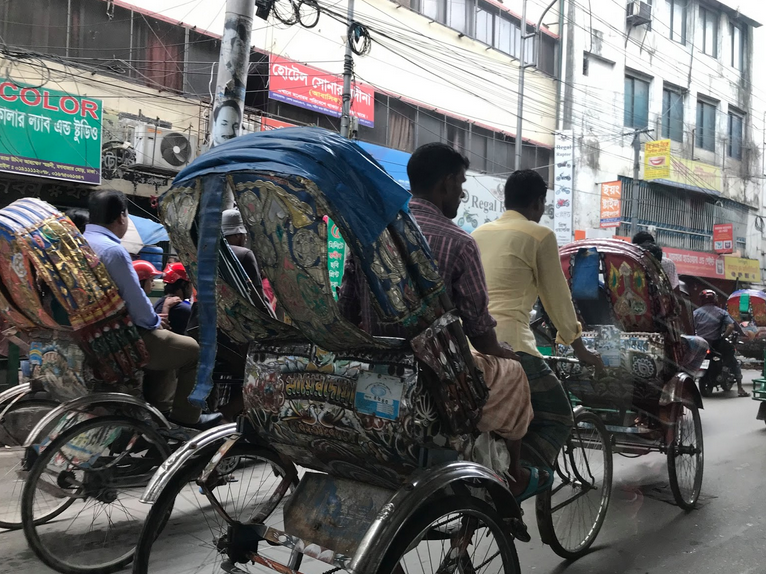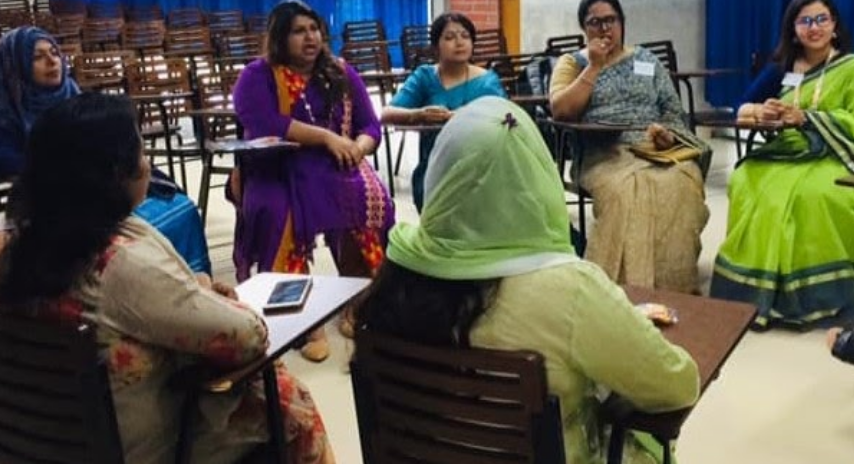An Untold Purple Story
Riyana breathes deeply and looks at the wall clock. It tells her that she needs to move more quickly to manage her morning tasks. Managing the house is her responsibility alone, and she does not want to be late for work.
She is trying to be more prompt in preparing her husband’s lunch box, along with doing all the other duties she has to do at home, before she herself gets ready to go out for the whole day. She has already finished making ‘ roti’ and ‘vaji’ for breakfast. She tried hard to make the ‘roti’ perfectly round, as before she got married she did not have the responsibility for making the morning breakfast table ‘roti’ and she has had to learn to do it well.

Photo by Kanita Ridwana
Roti is a “must”, a regular breakfast food for many Bangladeshi people, and she has to make it every day, but all the time, as she makes it, she feels she is forced to be very careful about how she does it. Every day she feels she has to do other little things like this, and that they must be done ‘perfectly’, like making sure the fried fish is tender enough, neither too deep-fried, nor half-cooked. Keeping such a high standard in so many small daily tasks is wearing her down.
Arish, her husband, considers himself to be a perfectionist and he does not accept anything that is less than perfect! He wants his food to be prepared freshly every day by Riyana herself. He can easily tell the difference between food which is prepared today and food that was cooked yesterday. He is very confident in the power of his own taste buds* and often boasts of this, so twenty-seven-year-old Riyana puts her best effort into being completely perfect. By doing this, she tries to win the heart of her husband, serving him the fresh, wonderful food he expects every day.
Arish always wants to motivate Riyana, his wife, to be a perfectionist like himself, and to be efficient in managing their house. He expects her to always keep the house very tidy, and to clean it carefully before she leaves for the day. But sometimes it becomes tiring and depressing for Riyana to keep to this strict standard. In his desire for excellence, Arish often becomes too critical of Riyana. His words seem cruel to her and make her feel unhappy. She does not want to show her feelings to others, but sometimes his hard words break her heart. She does not want to express her feelings, especially not to Arish. She has been brought up to believe that expressing one’s true feelings to outsiders is rather shameful, and she feels the need to maintain a good social image. She tries so hard to remain calm and patient, so as to maintain the image of being a “good” wife.
Riyana gives thanks to Allah that their four-year-old child does not complain about food. She wants her to grow up to be able to handle any situation which girls need to face, especially when they start their own family life, so for now she does not think too much about her child’s choice of food.
After preparing her husband’s lunch, Riyana prepares her own big water bottle to take to her place of work. She has not developed the habit of buying outside food. Not taking her lunch from home saves her another thirty minutes of time getting herself ready for work. By not taking her lunch, she tries to tell herself, instead, that going without food from time to time is a perfect way to maintain good health.
Today, she leaves the kitchen in a hurry. She waters the small flowering plants on the little outside balcony. This small task refreshes her mind each busy morning. Among the other flowers, the small purple-coloured “noyontara*” flower is her favourite, as she thinks this flower and women are very much like each other. Like women, the noyontara also grows and produces without too much attention and care, and it can survive even in a difficult situation.

Photo by Kanita Ridwana
Noyontara is a jungle flower, and is often considered not so special by many, and so it does not get much attention and love, but Riyana likes it. The lovely open purple flower reminds her that today is International Women’s Day and she needs to wear purple-coloured clothes to her office on this day. Riyana opens her almirah and tries to find some clothes that are close to purple in colour. These days, on International Women’s Day, women, especially those who work, wear a purple coloured sari to mark this special day. On other regular days, women usually wear a shalwar kamiz, but on this special day they prefer to honour their lives as women by wearing prettier clothes.

Photo by Kanita Ridwana
Men are no less well-dressed on this day, and also wear attractive clothes. Riyana sees her husband is wearing a pink tie with a light pink shirt for today’s Women’s Day celebration. She notices that he is looking well-dressed and attractive today. However, today she is in a hurry. She quickly chooses a purple and white shalwar kamiz with a pretty flower pattern for today’s office wear and decides not to wear the purple sari that she had earlier thought about wearing today. It takes more time to put on a sari than a shalwar kamiz.
These days the sari has become the official formal dress for working women, which is to be worn on special occasions. Riyana cannot understand how women used to wear a sari regularly and still manage to do everything they had to do in their life, in the old days. Riyana’s kamiz is not fully purple, but the purple colour is the strongest, so she feels that it will serve today’s purpose.
While putting the “orna” over her shoulder, Riyana notices that Arish is rushing out of the dining room in a hurry, without having his freshly made breakfast. Riyana reminds him from the bedroom by raising her voice, ”Don’t forget to have your breakfast.” Arish answers her sharply, “Riyana, when will you learn what to prioritise? You women are always too concerned about foolish things like food. If you were thinking like a real professional, you would change your plans to fit the situation. Why do you place so much importance on such a small thing as food?”
Riyana lets out a long breath and ties up her hair. She does not have enough time to remain sad at Arish’s sharp words. She needs to move quickly. Just after Arish leaves the house for his nearby office, the driver will bring the car back home so that Riyana can start for her office which is a little distant from her house. These days the roads of Dhaka city are filled with heavy traffic. It is really hard to know for sure when you will be able to reach the place to which you are going.
While stuck in traffic, Riyana is always thinking, “How can I manage to reach the office on time?” Arish does not like Riyana to leave for her office before he himself starts for his own office. He loves to see his wife wishing him “Goodbye” when he leaves for work each morning. But in fact, this sweet pain that comes from doing so much for the one you love, just makes Riyana’s life more difficult. She breathes deeply, thinking now about how she needs to pick up her daughter from school when it finishes. There is no one else to do that important task. In Dhaka, it is not safe to leave a little child, especially a girl, alone in the care of a hired driver.
Because of this, Riyana must finish teaching all her classes, and complete all her work and responsibilities before that time. These days she has become so tired that she becomes sleepy in the car. Every night, she has very few hours of sleep as she needs to bring university work home, as well as do everything that needs to be done around the house. She cannot manage the stress of being late for the office and picking up her daughter from her school on time every day.
Suddenly, Riyana’s mind comes back to the world around her. The car in which she is now travelling, throws her body forward as the driver suddenly brakes*. He had to stop the car quickly, because the vehicle in front of them also stopped suddenly. At this time of the day, the traffic becomes so heavy. You never know what another vehicle will do, and anything can happen, especially if the driver is not one hundred percent careful all the time. When driving in Dhaka City at the busiest times, the driver needs to be very skilled and has to think and act quickly. Riyana’s husband says anyone who can drive through this mass of cars and buses is able to drive in any part of the world.

Photo by Cherie Brown
Riyana can finally take a breath of relief! Yes! At last! She can see the gate of the office, after passing the big waves of rickshaws blocking the streets with their passengers of school-going children and their mothers. Finally, she has made it. The car stops and parks under a tree outside her building.

Photo by Cherie Brown
While getting out of the car, Riyana notices that some female students are also wearing purple clothes and have purple flowers in their long hair. She starts to climb up the stairs as there is a long line of people waiting for the lift. She climbs as quickly as she can, as she does not want to be late for her first class of the day.

Photo by Kanita Ridwana
At last, she reaches her office on the seventh floor. There are only fifteen more minutes left before she has to start her class. She breathes in relief! But suddenly, she remembers that there is an important meeting in the afternoon today and that means she won’t be able to pick up her daughter from school after all. She also remembers that four of her female co-workers are going to take maternity leave* at the end of this month. Their boss is naturally very anxious about this situation. How can he manage everything when four of his workers are going to take maternity leave together at the same time? They will definitely come back to work after they finish their maternity leave, but he thinks, of course, that they will have less energy and not the same interest in their work as they had before becoming busy with the duties of motherhood. Now, their focus will be on their child and they will struggle, because the childcare system is not yet developed fully enough to keep up with the needs of this new generation of working women.
This has made it really difficult to work with female co-workers. Of course, they have had to have better academic records than their male competitors in order to be chosen by the interview board, but now their boss looks at this situation from a different point of view.
He thinks it is true that female workers are sincere, co-operative and at the same time less likely to complain. Most importantly, you can pay them less money and give them fewer benefits, and they are not as demanding as their male co-workers. If he had chosen the males, now he would not need to be anxious about the unnecessary stress created by the needs of his female workers.
Even among the women who work with Riyana, there is a secret joke. They say that if any single female worker gives a wedding invitation to their boss, his heart aches about the future possibility of having to give her paid maternity leave. He remains unhappy for the next few days, and almost feels as if he has become like the betrayed fiancé of the person who is about to marry.
Riyana’s female co-workers make secret jokes about the boss in their short tea-time breaks, but these types of jokes are enjoyed only when everyone present is a female.

Photo by Cherie Brown
Riyana’s female friends who work in other places also think that the managers of their institutions also feel the same way. They too say that their bosses complain about the need to pay three month’s salary “unnecessarily” to employees who are not working and only staying at home. However, although the regular practice is to provide four months paid maternity leave, their institution gives three months leave only, without any medical benefits or maternity allowance being paid to them. It is very natural, then, that their boss now prefers male workers instead of females, even when they may be better qualified than the men. In the long run, they seem to think that employing females causes more trouble, and that is considered a problem for the institution. While thinking about how a boss can solve this problem, Riyana has forgotten her own personal problem of how to pick up her daughter from school.
From the flow of her thoughts about her work-related problems, she suddenly comes back to her own personal problem and tries to work out how to solve it. She picks up her cellphone to call her mother, who is her only helper in this type of day-to-day difficulty. She hesitates as she asks her mother if she can manage her time before going to a family gathering to celebrate Women’s Day, after picking up Riyana’s daughter from school. Giving thanks to Allah that her mother stopped working a few years back, Riyana is grateful that now she can offer a strong hand of support to Riyana, her youngest daughter. Otherwise, it would be impossible for Riyana to continue her job as a working mother. It is only her mother who really understands Riyana’s small, but regular life problems. Who else will understand her situation, except her own mother, who knows first-hand the difficulties she goes through in her everyday life.
When Riyana’s mother agrees to give up her time for Riyana and accepts the responsibility of not only picking her daughter up from school, but also agrees to take her to the Women’s Day get-together, Riyana breathes with relief. "Uff!" She hopes and prays that her own daughter will not face this type of struggle in her life when she becomes an adult. She remembers a few months back, when Arish, her husband, fell ill with both typhoid and dengue at the same time. At that time, she still had to come to the office, leaving her ill husband at home. She felt guilty, but she did not have any other choice. Her office would not allow her to take leave for that “foolish” reason. Her office was already troubled by mothers with problems, and was not uncommon for female workers to take sudden leave because of the need to take care of children who became ill.

Photo by Kanita Ridwana
Riyana’s mother-in-law also complained a little about her for leaving her ill husband at home alone. According to her, Riyana’s first priority was to take care of her family members, then after that came her responsibility to her place of work. She had questioned her daughter-in-law’s decision. “Why does Riyana have to go to work and leave her ill husband alone at home? She does not have any financial need to do a job? Alhamdulillah, my Arish earns enough to maintain his household very well.” the proud mother happily told her neighbours.
People sometimes remind Riyana that she only earns an average amount from her teaching job, not like the high salaries of many corporate jobs. They tell her she does not need to take this outside job seriously. But the reality is different. Though Riyana is not at all a perfectionist, according to Arish, she still cannot run away from her responsibilities. Even at that difficult time when Arish was ill, Riyana still had to prepare and stock the house with every necessary kind of food and everything else that was needed at home each day, and only then could she come to the office.
Sometimes, because she had to prepare so much, she became late for work, and had to put up with the unhappy face of her boss. She had to listen to her co-workers and boss claiming that she was avoiding the responsibilities of her job, and giving priority to her home life over her work. Because she did not want to be called ‘irresponsible’, she tried her best to work hard, and in fact, she ended up working too hard. In trying to balance these two parts of her life, she had to give up her sleep time, which was the only time she had for herself.
After doing this for a whole month she felt that her body could hardly bear the lack of sleep any more. She tried to decide, without any bias, to which group she really belonged. Was she responsible, or irresponsible? Was she just a lazy girl?
After thinking about this for some time, Riyana realised she was thankful to Arish for allowing her to keep going to her office while he was ill. Without his agreement, it would be impossible for her to continue her job.
Yes, Riyana does not earn a large amount from teaching young people, as teaching is not considered by many to be a real profession in Bangladesh. This job does not offer a high salary, but it still gives her a deep sense of satisfaction as it helps her to live her dream of being a caring guide to the next generation. Naturally, Riyana cannot share these thoughts with anybody else, neither with her co-workers nor with her relatives. These days she does not spend time with her school, college or former university friends any more, as she cannot find any time to meet with them, like she did in the ‘good old days’, before she got married.
In fact, all her friends are struggling, just like her, to maintain a balance between life and work, so these are just secrets that she needs to keep in the depths of her own heart. She can only store these thoughts, and sometimes open the door of the secret place in her heart, to consider those foolish matters for a while. Then, again, she has to close the door tightly, so that no one notices the unhappy feelings she is hiding beneath her so-called happy perfect life. These are the treasures of her own heart, which she alone one can hold on to. It is only her mother with whom she sometimes shares some shadows of these gray experiences of life, since she herself has travelled along the same path, in the same journey towards becoming a woman.
Today, going over all her difficulties, Riyana comes back to her real world, her place of work. After solving the problem of picking up her daughter from school, Riyana now feels a sense of relief and realises that she is thirsty. After climbing the seven flights of stairs so quickly, she sits down to rest on her chair. She looks about for her water bottle and finds that it is missing. Because she had to leave the house in such a hurry, she has left it at home on the dining table by mistake.
Anis bhai, who is the oldest male member of her department, passes by and sits on the chair beside her. Riyana notices that Anis bhai is also wearing a pink shirt on the occasion of Women’s Day! Riyana takes another deep breath. Next time, she needs to be prepared earlier and must be more careful to choose more suitable clothes for these special days. She realises that she has given up her love of wearing attractive fashionable clothes, earrings and matching shoes so she can maintain a ‘perfect’ family. “Ahh!” A long heavy breath comes from deep within her! InshAllah, in future, she hopes will be able to wear those lovely things again.
Understanding that Riyana is thirsty and has left her water bottle at home, Anis bhai offers to share his own water pot with Riyana and says kindly, “My wife is so lovely that she is ready to give up her own career, and has happily become a homemaker for the good of our family. She cares so much for my family members and is so devoted to her household tasks. She never forgets to give me everything I need, every day. She is indeed a perfect wife!”
Again, Riyana breathes deeply and tries to hide her unhappy feelings. She thanks Anis bhai for offering her the water, and says gently, “Anis bhai, you are so lucky to have a woman like Shumee bhabi in your life. She is indeed perfect.”
______________________________________________________________
Learning Activities
Vocabulary
-
Academic Word List (AWL) Words: These words are commonly found in academic (university level) reading texts in all subject areas. If you study at university, or plan to do so in the future, you should spend time learning these words.
| academic | depressing | generation | motivate | task |
| benefits | devoted | image | percent | vehicle |
| bias | energy | institution | prioritise / priority | word part: co- (prefix) |
| corporate | finally | job | professional | |
| created | financial | maintain | stress | |
| definitely | focus | medical | survive |
-
Offlist Words: These words are not so common in English. Do not spend time learning them, unless you know all the Academic Word List words well, as you will not meet them so often.
| balcony | career | childcare |
fiancé (male) or fiancée (female) |
interview |
| betrayed | celebrate / celebration | competitors | homemaker | jungle |
| boss | cellphone | earrings | household | perfectionist |
Glossary
brake: (Noun) - part of a car. (Verb) - the action of stopping a car using a foot pedal.
maternity leave: a period of time when women may stay away from work in order to give birth and care for a new baby. In some places this is now called ‘parental’ leave, since men may also wish to take time off work to care for a new child.
noyontara: a very common tiny flower (mostly) seen in purple and white shades, which grows in abundance without much care and effort. Sometimes it is also considered as a jungle flower, as it often grows by itself, without being planted.
taste buds: the small bumps on your tongue that help you to taste the different qualities of the foods you eat (eg. sweet, salty, spicy, acidic. etc.)
____________________________________________________________
Learning Activities
Comprehension Questions
-
Remembering: According to the story, in what ways is Riyana’s husband, Arish, a perfectionist?
-
Understanding: How does Riyana feel about her mother-in-law’s opinion about her job? How do you know?
-
Inferring: What motivates Riyana to continue working, even though her life is so busy and she is so tired? What clues in the story helped you to answer this question?
Critical Thinking Questions
-
Analysing: Whom do you consider to be the real perfectionist in this story, Riyana or her husband Arish? Why?
-
Analysing: Compare Riyana and Shumee. Who, in your view, is more perfect? Why?
-
Evaluating: Do you think Riyana’s attempts to try to do everything herself is justified? Do you agree with her reasoning? Why/Why not?
-
Evaluating: Do you think a woman like Riyana who does not have a financial need to support her family, needs to continue in her profession to maintain her identity? Why? Why not?
-
Applying: If you are a female, and you marry, do you wish to continue in your career after marriage or not? Why? If you are a male, how do you feel about the possibility of your wife working outside the home? What are your reasons for thinking that way? In the story, Riyana sounds tired and depressed. Her experience is not uncommon for women who work and care for their families at the same time. How could life be made easier for women in this situation, in your view?
-
Evaluating and Applying: What, in your opinion, is the value of a day like International Women’s Day? Should it be a public holiday? Give some reasons for your answers. In what ways can this special day be celebrated more effectively? Do you think there should be an International Men’s Day? or Children’s Day, or Grandparents Day? Why/Why not? What other special days should be celebrated?
-
Creating: Did the ending of the story satisfy you? How would you end this story? Re-write the ending the way you think it should be.
-
Creating: Think about the day described in the story from the point of view of Arish. In what ways would his daily life be different from that of Riyana? Is it harder or easier, in your view? In what ways is life tough for men? Retell (aloud), or rewrite the story of this day from the Arish’s point of view.
-
Integrated activity: Have a debate with your classmates about the following topic. “Life is more difficult for women than men.”
Divide your class into two teams. Half the class should argue in agreement with the statement, and the other half should argue against it. Everyone should prepare some brief notes from which to speak.
The members of each team should take turns to speak, stating their points and give supporting reasons for these, in English. Each person should speak for around two minutes.
At the end, have a secret class vote (on paper) on the topic, with each person voting the way that they REALLY feel. Count up the votes, and see which side of the argument most people voted for.
-
If International Women’s Day is coming soon, plan a class celebration. What will you do to make this day special? Check out some English information about this day online. Make your celebration plans in ENGLISH, organise who will do what, and think about what you might need. Finally, put your plans into action and enjoy the day.